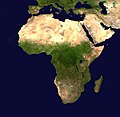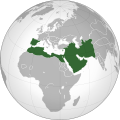Portal:Africa



Africa is the world's second-largest and second-most populous continent after Asia. At about 30.3 million km2 (11.7 million square miles) including adjacent islands, it covers 20% of Earth's land area and 6% of its total surface area. With nearly 1.4 billion people as of 2021, it accounts for about 18% of the world's human population. Africa's population is the youngest among all the continents; the median age in 2012 was 19.7, when the worldwide median age was 30.4. Based on 2024 projections, Africa's population will exceed 3.8 billion people by 2100. Africa is the least wealthy inhabited continent per capita and second-least wealthy by total wealth, ahead of Oceania. Scholars have attributed this to different factors including geography, climate, corruption, colonialism, the Cold War, and neocolonialism. Despite this low concentration of wealth, recent economic expansion and a large and young population make Africa an important economic market in the broader global context, and Africa has a large quantity of natural resources.
The continent includes Madagascar and various archipelagos. It contains 54 fully recognised sovereign states, eight cities and islands that are part of non-African states, and two de facto independent states with limited or no recognition. This count does not include Malta and Sicily, which are geologically part of the African continent. Algeria is Africa's largest country by area, and Nigeria is its largest by population. African nations cooperate through the establishment of the African Union, which is headquartered in Addis Ababa.
Africa is highly biodiverse; it is the continent with the largest number of megafauna species, as it was least affected by the extinction of the Pleistocene megafauna. However, Africa is also heavily affected by a wide range of environmental issues, including desertification, deforestation, water scarcity, and pollution. These entrenched environmental concerns are expected to worsen as climate change impacts Africa. The UN Intergovernmental Panel on Climate Change has identified Africa as the continent most vulnerable to climate change.
The history of Africa is long, complex, and varied, and has often been under-appreciated by the global historical community. In African societies the oral word is revered, and they have generally recorded their history via oral tradition, which has led anthropologists to term them "oral civilisations", contrasted with "literate civilisations" which pride the written word. African culture is rich and diverse both within and between the continent's regions, encompassing art, cuisine, music and dance, religion, and dress. (Full article...)
Selected article –
The Congo River, formerly also known as the Zaire River, is the second-longest river in Africa, shorter only than the Nile, as well as the third-largest river in the world by discharge volume, following the Amazon and Ganges rivers. It is the world's deepest recorded river, with measured depths of around 220 m (720 ft). The Congo–Lualaba–Luvua–Luapula–Chambeshi River system has an overall length of 4,700 km (2,900 mi), which makes it the world's ninth-longest river. The Chambeshi is a tributary of the Lualaba River, and Lualaba is the name of the Congo River upstream of Boyoma Falls, extending for 1,800 km (1,100 mi).
Measured along with the Lualaba, the main tributary, the Congo River has a total length of 4,370 km (2,720 mi). It is the only major river to cross the equator twice. The Congo Basin has a total area of about 4,000,000 km2 (1,500,000 sq mi), or 13% of the entire African landmass. (Full article...)
Featured pictures –
Did you know (auto-generated) -

- ... that South African civil rights activist Thambi Naidoo was arrested along with Mahatma Gandhi and sent outside of Transvaal for refusing to register?
- ... that weightlifter Oun Yao-ling was asked to compete in the South African Games, but the invitation was swiftly rescinded once the organisers learned that he was Chinese, not white?
- ... that Olive MacLeod journeyed 6,000 km (3,700 mi) through Africa in 1910–1911 to visit her murdered fiancé's grave, and wrote a book based on her observations?
- ... that Ralph E. Brock was the first academically trained African-American forester in the United States?
- ... that the son of an engine fitter from England became Director of Education in part of modern-day South Africa for almost twenty years?
- ... that Their Highest Potential shows the positive side of segregated schools, as written by a student who was taught in one?
Categories
Selected biography –

Charles Atangana (c. 1880 – 1 September 1943), also known by his birth name, Ntsama, and his German name, Karl, was born in 1880. He was the paramount ruler of the Ewodo people. (Full article...)
Selected country –
 |
 |
||

| |||
Malawi, officially the Republic of Malawi (formerly Nyasaland), is a country in southeastern Africa. It borders Zambia to the north-west, Tanzania to the north, and Mozambique to the east, south, and west.
The Great Rift Valley runs through the country from north to south. In this deep trough lies Lake Malawi (also called Lake Nyasa), the third-largest lake in Africa, and the tenth largest in the world, constituting about 20% of Malawi's area. East and west of the Rift Valley are high plateaus, generally between 900 and 1,200 m (3,000–4,000 ft) above sea level. The Nyika Uplands rise as high as 2,600 m (8,500 ft) in the north and south of the lake lie the Shire Highlands, with an elevation of 600–1,600 m (2,000–5,000 ft).
Malawi is one of Sub-Saharan Africa's most densely populated countries. Lilongwe, Malawi's capital since 1971, has a population of more than 400,000. Blantyre remains Malawi's major commercial center and largest city, having grown from an estimated 109,000 inhabitants in 1966 to nearly 500,000 in 1998. (Read more...)
Selected city –
Abidjan (/ˌæbɪˈdʒɑːn/ AB-ih-JAHN, French: [abidʒɑ̃]; N'ko: ߊߓߌߖߊ߲߬) is the largest city and the former capital of Ivory Coast. As of the 2021 census, Abidjan's population was 6.3 million, which is 21.5 percent of the overall population of the country, making it the sixth most populous city proper in Africa, after Lagos, Cairo, Kinshasa, Dar es Salaam, and Johannesburg. A cultural crossroads of West Africa, Abidjan is characterised by a high level of industrialisation and urbanisation. It is the most populous French-speaking city in West Africa.
The city expanded quickly after the construction of a new wharf in 1931, followed by its designation as the capital city of the then-French colony in 1933. The completion of the Vridi Canal in 1951 enabled Abidjan to become an important sea port. Abidjan remained the capital of Ivory Coast after its independence from France in 1960. In 1983, the city of Yamoussoukro was designated as the official political capital of Ivory Coast. However, Abidjan has officially been designated as the "economic capital" of the country, because it is the largest city in the country and the centre of its economic activity. Many political institutions and all foreign embassies continue to be located in Abidjan as well. The Abidjan Autonomous District, which encompasses the city and some of its suburbs, is one of the 14 districts of Ivory Coast. (Full article...)
In the news
- 5 June 2025 – Mediterranean Sea migrant smuggling, Sudanese refugee crisis
- The Freedom Flotilla, a flotilla carrying humanitarian aid en route to Gaza with Swedish activist Greta Thunberg, Irish actor Liam Cunningham, and French European Parliament member Rima Hassan, rescue four Sudanese civil war refugees from a dinghy near Libya. (The Times of Israel) (The Print)
- 5 June 2025 –
- The government of the Ivory Coast declares an outbreak of cholera after confirming seven recent deaths from the disease, and calling on the population to remain vigilant. (AP)
- 5 June 2025 – Chad–United States relations
- Chad suspends the issuance of visas to U.S. citizens in response to a new travel ban announced by U.S. president Donald Trump, that includes Chad among twelve countries facing entry restrictions. (BBC News)
- 5 June 2025 – 2025 Burundian parliamentary election
- Citizens of Burundi vote to elect 100 of the 123 members of the National Assembly. (BBC News) (DW)
- 4 June 2025 – Islamic State insurgency in Puntland
- Puntland's elite security forces kills over 35 ISIS militants, including several foreign fighters, in a major military operation conducted in the mountainous rural areas in the Bari region of Puntland. The troops also destroy weapons caches and military equipment used by the group. (Shabelle Media) (AllAfrica)
- 3 June 2025 – Allied Democratic Forces insurgency
- Two people, including a suicide bomber, are killed near a Roman Catholic shrine in Kampala, Uganda, on Uganda Martyrs' Day. Police attribute the bombing to Allied Democratic Forces rebels. (Reuters)
Updated: 14:05, 6 June 2025
General images -
Africa topics
More did you know –

- ...that the 1459 Fra Mauro map (pictured) reports that "a junk from India" rounded the Cape of Good Hope in 1420, around 70 years before the navigations of Vasco da Gama?
- ...that the 1998 Sudan famine was caused by human rights abuses in the midst of the Second Sudanese Civil War?
- ...that a smokie is a West African delicacy made by blowtorching the carcass of a sheep or goat without removing its fleece?
- ...that Anne-Marie Nzié, a Cameroonian bikutsi singer, dedicated the song Liberté to President Paul Biya and his party, the Cameroon People's Democratic Movement?
Related portals
Major Religions in Africa
North Africa
West Africa
Central Africa
East Africa
Southern Africa
Associated Wikimedia
The following Wikimedia Foundation sister projects provide more on this subject:
-
Commons
Free media repository -
Wikibooks
Free textbooks and manuals -
Wikidata
Free knowledge base -
Wikinews
Free-content news -
Wikiquote
Collection of quotations -
Wikisource
Free-content library -
Wikispecies
Directory of species -
Wikiversity
Free learning tools -
Wikivoyage
Free travel guide -
Wiktionary
Dictionary and thesaurus



























































































